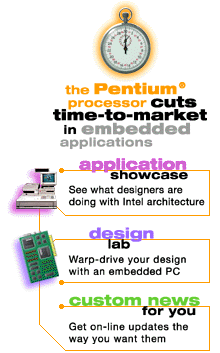
Intel Architecture:
Cornerstone of the Embedded PC
Intel architecture is the core building block of today's most advanced PC technology. So it's little wonder that it's
also at the heart of the world's most advanced embedded PC applications. The PentiumŪ processor and Intel PCIsets bring
advanced performance and features to leading-edge embedded products, from remote data collection in a Brazilian rainforest
to interactive multimedia on an airliner cruising at 35,000 feet.
Basing new products on Intel architecture embedded PC designs makes sense for developers for several key reasons:
Time-to-market: embedded PC architecture allows developers of embedded products to shorten their development
cycle by conducting their design on a familiar and proven platform.
Service and support: basing new embedded designs on PC architecture allows product designers to benefit from
the wide array of widely available form factor single-board computer solutions, development tools and technical support
available from third-party vendors.
PC interoperability: embedded PC architecture also enables designers to create products with a high level
of interoperability and software code compatibility with desktop PCs.
Scalability: the PC architecture is inherently scalable and upgradable, allowing developers to add product value
by leveraging the performance advantages of new Intel processors and chipsets.
Look to Intel for the Products and Support You Need
The Intel architecture embedded 16- and 32-bit processors offer a price performance range which make them perfect
for embedded applications. In fact, the core architecture for these processors is the same as that developed for the
PC industry and offers software compatibility and a huge support infrastructure.
Tools suites, development platforms, compilers, debuggers, emulators, textbooks and training seminars from Intel
and third-party suppliers can further reduce your time-to-market.
The right products and the right support are the reasons that Intel architecture now powers a broad spectrum of
communication information systems, including digital cellular telephones, hand-held communicators and terminals,
personal digital assistants, wired and wireless network interface cards, fax machines, modems and office automation
peripherals. You'll also find Intel architecture in many traditional, real-time applications, such as scientific
instruments, factory automation, robotics, measurement control systems, sensors and test equipment.
|
